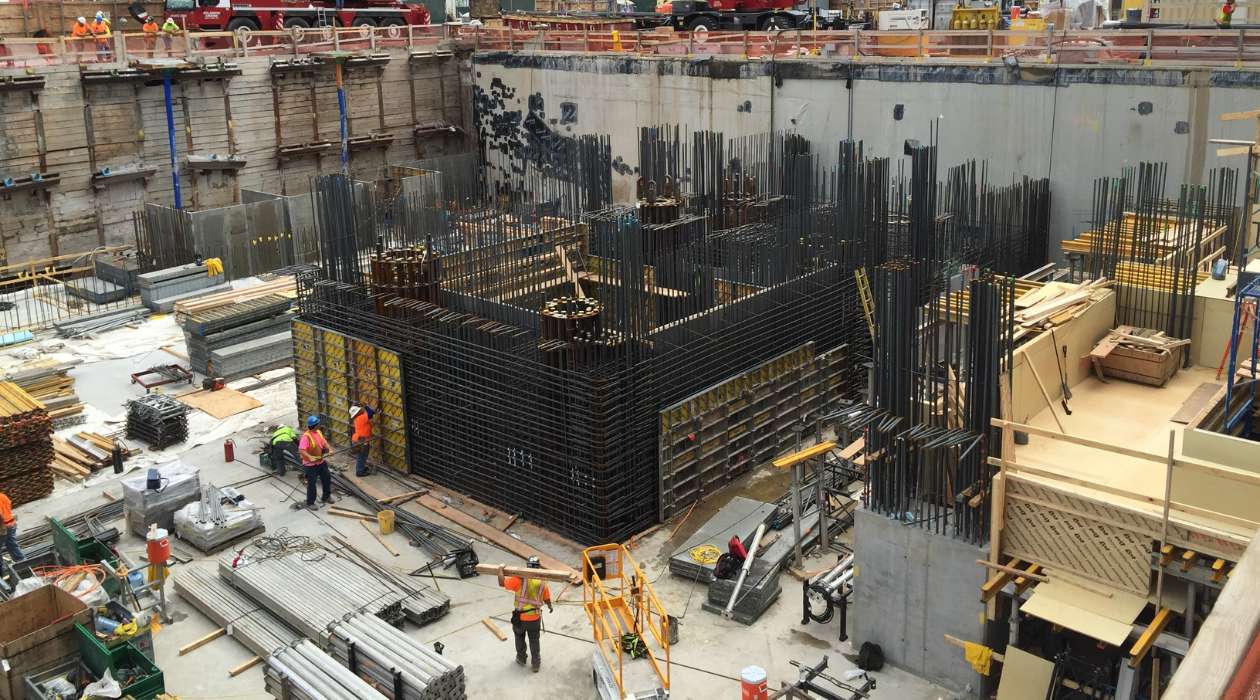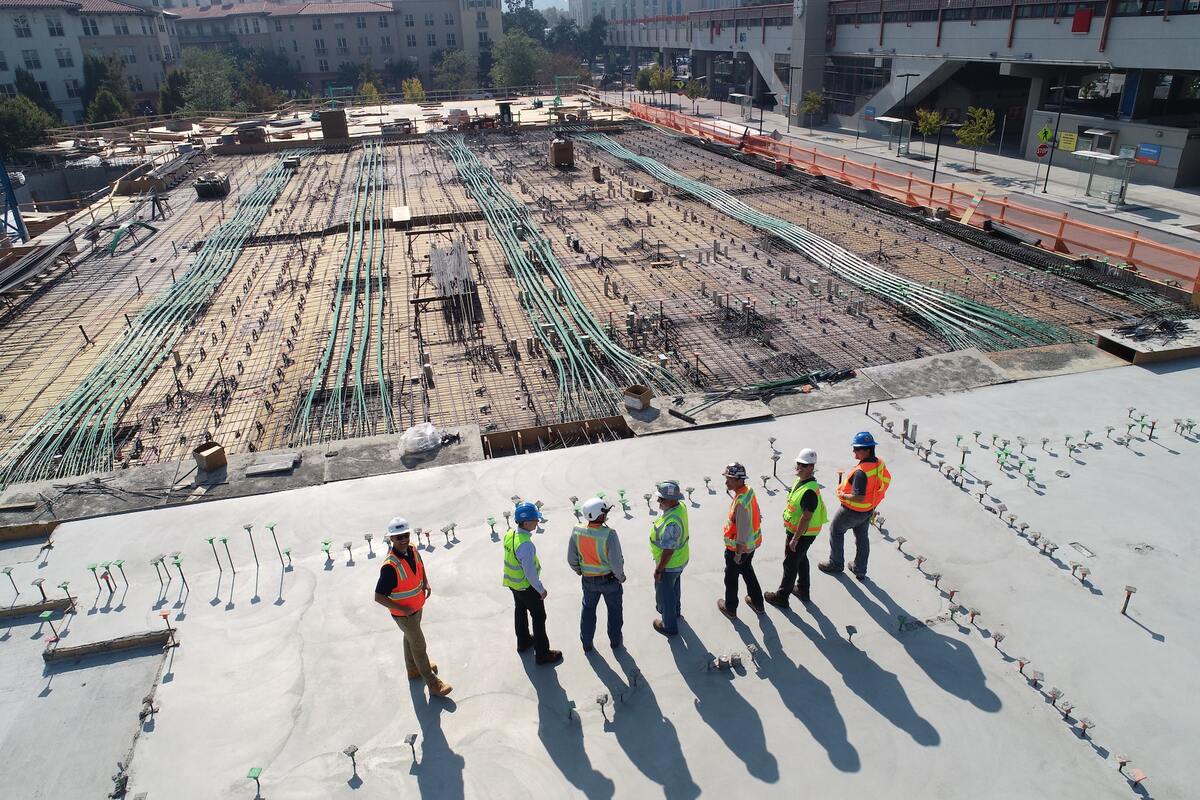Home>diy>Building & Construction>How To Sell A Construction Company


Building & Construction
How To Sell A Construction Company
Modified: October 27, 2024
Looking to sell your construction company? Learn the strategic steps and valuable insights on how to navigate the selling process in the building construction industry.
(Many of the links in this article redirect to a specific reviewed product. Your purchase of these products through affiliate links helps to generate commission for Storables.com, at no extra cost. Learn more)
Introduction
Considering selling your construction company? It’s a major decision that requires careful planning and execution. Whether you’re retiring, looking for new opportunities, or simply ready to move on, selling a construction company can be a complex process. However, with the right approach and a solid understanding of the steps involved, you can maximize the value of your business and ensure a smooth transition.
In this article, we will guide you through the process of selling a construction company. From evaluating your business to negotiating the sale and completing the legal process, we’ll provide you with valuable insights and tips to navigate each step successfully.
Before diving into the specifics, it’s important to recognize that selling a construction company is much more than just selling equipment and inventory. It involves selling the brand, reputation, client base, and most importantly, the expertise and skills of your team. Potential buyers are looking for a profitable and sustainable business that aligns with their goals and objectives.
Therefore, it is crucial to properly prepare your construction company for sale, ensuring it is in the best possible shape to attract potential buyers and command a desirable price. This includes evaluating your business, preparing financial documents, determining the company’s value, and finding the right buyers.
Selling a construction company can be a lengthy process, often taking several months or even years to complete. It requires patience, persistence, and careful planning. However, with the right approach, you can successfully navigate each step and achieve a successful sale.
In the following sections, we will break down the process into seven key steps, providing you with a comprehensive guide on how to sell a construction company:
Key Takeaways:
- Thoroughly evaluate your construction company’s financial health, infrastructure, client base, and workforce to maximize its value and attract potential buyers. Seek professional assistance for an unbiased assessment.
- Employ a well-defined marketing strategy to find potential buyers, engage in effective negotiations, complete the legal process with the help of experienced professionals, and ensure a smooth transition for a successful sale of your construction company.
Read more: How To Name A Construction Company
Step 1: Evaluate the Business
Before embarking on the journey of selling your construction company, it’s crucial to thoroughly evaluate your business. This step allows you to gain a clear understanding of its strengths, weaknesses, and overall value. By conducting a comprehensive assessment, you’ll be better equipped to present your company to potential buyers, negotiate the sale, and maximize its value.
Start by examining your financial records, including profit and loss statements, balance sheets, and tax returns for the past few years. This will give you a clear picture of your company’s financial health and its growth trajectory. It will also help you identify any areas that may need improvement before selling.
Another critical aspect to evaluate is your company’s infrastructure and operations. Assess the equipment, facilities, and technology you possess. Determine if any upgrades or repairs are necessary to make your company more attractive to potential buyers.
Next, evaluate your client base. Examine long-term contracts, customer relationships, and the overall reputation of your company in the market. A strong and loyal customer base will significantly enhance the value of your business.
Additionally, take stock of your workforce. Evaluate the skills, experience, and expertise of your employees. This will demonstrate to potential buyers the strength of your team and reassure them of a smooth transition.
During the evaluation process, it’s also important to identify any potential legal issues or liabilities that could impact the sale. Addressing these matters beforehand will not only prevent any deal-breaking surprises but also instill confidence in potential buyers.
Finally, seek the assistance of professionals, such as business appraisers or consultants with expertise in the construction industry. They can provide an unbiased assessment of your company’s value and help you identify areas for improvement.
By thoroughly evaluating your construction company, you will gain a comprehensive understanding of its worth and be better positioned to present it to potential buyers. This step lays the foundation for a successful sale and ensures that you get the maximum value for your business.
Step 2: Prepare Financial Documents
When selling a construction company, one of the most crucial steps is to prepare comprehensive and accurate financial documents. These documents not only provide potential buyers with a clear understanding of your company’s financial health but also instill confidence in their investment.
Start by organizing your financial records, including income statements, balance sheets, cash flow statements, and tax returns for at least the past three years. This historical financial data will provide potential buyers with a clear snapshot of the company’s performance and growth trajectory.
In addition to the financial statements, consider preparing a detailed portfolio of your company’s projects. Include information on completed projects, ongoing contracts, and upcoming opportunities. This will not only showcase the diversity and scale of your work but also demonstrate your ability to secure and deliver projects successfully.
Furthermore, prepare a detailed breakdown of your company’s assets and liabilities. This should include a thorough inventory of equipment, vehicles, real estate, and any other tangible assets. It’s essential to highlight any valuable or unique assets that could potentially add value to the sale.
Aside from financial records, potential buyers will also be interested in reviewing your company’s contracts, permits, licenses, insurance policies, and any pending or past legal disputes. Prepare a comprehensive overview of these documents to facilitate the due diligence process and provide transparency.
During the process of preparing financial documents, it is advisable to consult with an accountant or financial advisor who specializes in business sales. They can assist you in ensuring that the documents are accurate, consistent, and compliant with accounting standards.
Remember, the goal of preparing financial documents is to present an accurate and compelling picture of your construction company’s financial performance. By doing so, you will instill confidence in potential buyers, increase their trust in your business, and ultimately maximize the value of your company.
Step 3: Determine the Company’s Value
One of the most critical steps in selling a construction company is determining its value. The valuation process ensures that you set a realistic asking price and negotiate a fair deal with potential buyers. Several methodologies can be used to determine the value of your company, including:
- Income-based valuation: This approach assesses the future earning potential of your construction company. It involves analyzing financial statements, projected cash flows, and industry trends to estimate the company’s net worth.
- Market-based valuation: This method looks at recent sale transactions of similar construction companies in the market. By comparing your company to others in terms of size, revenue, and market share, you can gauge its value relative to the industry.
- Asset-based valuation: This approach focuses on the tangible and intangible assets of your construction company, such as equipment, real estate, intellectual property, and brand value. It involves calculating the net value of these assets and considering any liabilities.
It’s recommended to seek the assistance of a professional business appraiser who specializes in the construction industry. They will have the expertise and market knowledge to accurately assess the value of your company based on these methodologies.
Additionally, consider conducting a SWOT analysis (Strengths, Weaknesses, Opportunities, and Threats) of your construction company. This will provide a holistic view of your business and help identify areas that could potentially increase or decrease its value.
It’s important to note that while determining the value of your construction company is essential, the final sale price will also depend on market conditions, buyer interest, and negotiation skills. Be prepared to be flexible and open to discussions to reach a mutually beneficial agreement.
Remember, accurately determining the value of your construction company is crucial for a successful sale. It sets the foundation for negotiations and ensures that you receive a fair price for your hard work and investment.
Step 4: Find Potential Buyers
After evaluating your construction company and determining its value, the next step is to find potential buyers who are interested in acquiring your business. This process requires a well-defined strategy and effective marketing efforts to reach the right audience.
Start by creating a marketing plan that outlines your target market. Consider the type of buyer you are looking for – whether it’s an individual investor, a competitor, or a larger construction firm seeking growth opportunities. Understanding your ideal buyer profile will help you tailor your marketing efforts and focus your resources.
Utilize both online and offline channels to reach potential buyers. Online platforms, such as business-for-sale marketplaces and industry-specific websites, are great places to list your business and attract interested parties. Consider engaging the services of a business broker who specializes in construction industry deals, as they have connections and resources to connect you with qualified buyers.
In addition to online channels, leverage your network and industry contacts. Attend industry events, participate in conferences, and join professional associations to expand your reach and connect with potential buyers. Word-of-mouth referrals from trusted industry peers can often yield quality leads.
Confidentiality is crucial during the buyer search process. Ensure that the information you share about your company is provided only to serious and qualified buyers. Consider carefully screening interested parties by requesting non-disclosure agreements (NDAs) before sharing sensitive financial and operational details.
When approaching potential buyers, be prepared with a compelling sales pitch that highlights the unique strengths and value of your construction company. Present them with a comprehensive information package that includes financial statements, client testimonials, project portfolios, and any other relevant documentation that demonstrates the potential and attractiveness of your business.
Remember to be patient during the buyer search process. Finding the right buyer who is genuinely interested and willing to meet your terms can take time. Be prepared for negotiations and open to discussions to ensure a successful and mutually beneficial transaction.
By employing an effective marketing strategy and leveraging your network, you can identify potential buyers who are interested in acquiring your construction company. This step sets the stage for the next phase of negotiations and brings you closer to completing the sale.
Tip: When selling a construction company, make sure to have all financial records in order and be transparent about any potential liabilities. A thorough valuation of the business will also help attract potential buyers.
Read more: How To Market A Construction Company
Step 5: Negotiate the Sale
Once you’ve found potential buyers for your construction company, it’s time to enter into negotiations to secure a favorable deal. Negotiating the terms of the sale requires careful planning, effective communication, and a clear understanding of your objectives and priorities.
Start by setting your negotiation goals. Determine your desired sale price, payment structure, and any other terms that are important to you. Consider factors such as the timeline for the transition, employee retention, and post-sale involvement. Having a clear vision of what you want to achieve will guide your negotiation strategy.
During the negotiation process, be prepared to provide detailed financial information, including profit margins, revenue streams, and potential growth opportunities. This will demonstrate the value and potential of your construction company, strengthening your position at the negotiating table.
Listen carefully to the buyer’s interests and concerns. Understand their motivations for acquiring your business and their expectations for the future. Identifying their key priorities will enable you to find common ground and create a win-win situation.
Flexibility is essential during negotiations. Be open to compromise and creative solutions to bridge any gaps between your expectations and those of the buyer. Consider alternative deal structures, such as earn-outs or seller financing, to accommodate different financial situations and increase the appeal of the deal.
Engage the services of experienced professionals when negotiating the sale. A business broker or attorney specializing in mergers and acquisitions can provide valuable guidance and advice, ensuring that your interests are protected throughout the negotiation process.
Remember that the negotiation process may involve multiple rounds of discussions and counteroffers. Remain patient and committed to finding common ground. When necessary, take breaks to assess and strategize. Keep the lines of communication open and maintain a professional and constructive approach.
Ultimately, the goal of the negotiation process is to reach a mutually beneficial agreement that meets your financial objectives and secures a smooth transition for your construction company. With effective negotiation skills and a clear focus on your goals, you can successfully navigate this crucial step in the selling process.
Step 6: Complete the Legal Process
As you near the end of the selling journey for your construction company, it’s time to complete the necessary legal processes to finalize the sale. This step involves ensuring all the legal aspects are addressed, contracts are drafted and reviewed, and the necessary approvals and documentation are obtained.
Engage the services of an experienced business attorney who specializes in mergers and acquisitions to guide you through the legal process. They will ensure that all necessary legal documents, such as the purchase agreement, non-compete agreements, and confidentiality agreements, are properly drafted and reviewed.
Review the purchase agreement in detail with your attorney, making sure it accurately reflects the negotiated terms and conditions of the sale. This document will outline the purchase price, payment terms, representations, and warranties, as well as any post-sale obligations or agreements.
Due diligence plays a crucial role during this stage. The buyer will conduct a comprehensive review of your construction company’s financial, legal, and operational records. Be prepared to provide all requested documents and information to facilitate this process. Work closely with your attorney and accountant to ensure that all necessary documentation is provided accurately and promptly.
During the legal process, it’s important to address any outstanding legal or regulatory issues that may impact the sale. This includes resolving any pending disputes, ensuring compliance with permits and licenses, and transferring ownership of assets, contracts, and intellectual property rights.
Once the legal process is complete, it is essential to obtain the necessary approvals and consents for the sale. This may involve obtaining consent from lenders, stakeholders, or regulatory bodies. Your attorney will guide you through this process and ensure all required approvals are obtained before proceeding with the sale.
Keep in mind that the legal process may take time, depending on the complexity of the transaction and the involvement of multiple parties. Patience and open communication with your attorney and the buyer are crucial during this stage to ensure a smooth and successful completion of the sale.
Completing the legal process is a critical step in selling your construction company. By working closely with your attorney, addressing any legal issues, and obtaining the necessary approvals, you can ensure a legally sound and successful transaction.
Step 7: Transition and Handover
As you approach the final stage of selling your construction company, it’s time to focus on the transition and handover process. This step involves transferring the operations, relationships, and knowledge of your business to the new owner, ensuring a smooth transition and continuity of operations.
One of the key aspects of a successful transition is effective communication with the buyer. Clearly outline your expectations and responsibilities during the handover period. Provide them with comprehensive documentation and training on the day-to-day operations of the business, key client relationships, ongoing projects, and any specific procedures or protocols that are unique to your company.
Introduce the buyer to your key employees and encourage open lines of communication. This will help build trust and facilitate a smooth transition for both the buyer and your employees. Assure your employees of their future with the company under new ownership and communicate any changes in roles or responsibilities.
During this time, be available to provide guidance and support, but also give the new owner space to make their own decisions and put their stamp on the business. Respect their vision for the company while offering your expertise and insights when necessary.
Consider staying on board for a transitional period, if possible and desired by both parties, to provide guidance and support during the initial stages of the ownership transfer. This can help ensure a seamless transition, maintain relationships with clients and suppliers, and address any challenges that may arise.
Keep in mind that the transition and handover process may take some time. Be patient and flexible, as it is important to give the new owner the necessary space and time to acclimate to their new role and integrate into the company.
Lastly, celebrate the successful sale of your construction company and the beginning of a new chapter. Take pride in the legacy you’ve built and the opportunities you’ve created for the future owner. Celebrating this milestone can help foster positive relationships and solidify the foundation for a successful transition.
The transition and handover process is crucial to ensure the continued success of your construction company in the hands of the new owner. By effectively communicating, providing support, and fostering a positive relationship, you can facilitate a smooth transition and set the stage for a prosperous future for your business.
Conclusion
Selling a construction company is a significant decision that requires careful planning, evaluation, and execution. By following the seven steps outlined in this guide, you can navigate the selling process successfully and maximize the value of your business.
Starting with a thorough evaluation of your construction company, you gain a clear understanding of its strengths, weaknesses, and overall value. This allows you to present your business in the best possible light to potential buyers.
Preparing comprehensive financial documents and determining the company’s value are critical steps in attracting and negotiating with potential buyers. By providing accurate and compelling financial information, you instill confidence and increase the likelihood of securing a favorable deal.
Finding potential buyers requires a well-defined marketing strategy that leverages both online and offline channels. Engaging the services of professionals and leveraging your network can help in identifying qualified buyers who align with your company’s objectives.
The negotiation stage is crucial in securing a deal that meets your financial goals and ensures a smooth transition. Flexibility, effective communication, and guidance from experts play a key role in reaching a mutually beneficial agreement.
Completing the legal process and obtaining necessary approvals are essential to ensure a legally sound transaction. A skilled attorney specializing in mergers and acquisitions can assist in drafting crucial legal documents and facilitating a smooth transition.
Finally, a successful transition and handover process ensure that the new owner can seamlessly take over the operations and maintain relationships with clients, suppliers, and employees.
Selling a construction company is a journey that requires patience, careful planning, and attention to detail. By following these steps, you can navigate the process with confidence, maximize the value of your business, and embark on a new chapter. Remember to seek the guidance of professionals, rely on your experience, and embrace the opportunities that lie ahead.
Frequently Asked Questions about How To Sell A Construction Company
Was this page helpful?
At Storables.com, we guarantee accurate and reliable information. Our content, validated by Expert Board Contributors, is crafted following stringent Editorial Policies. We're committed to providing you with well-researched, expert-backed insights for all your informational needs.















0 thoughts on “How To Sell A Construction Company”